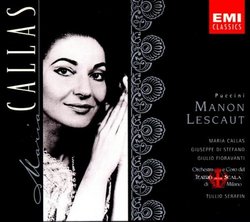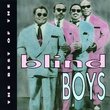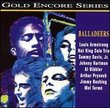| All Artists: Maria Callas, Fiorenza Cossotto, Giulio Fioravanti, Carlo Forti, Giuseppe di Stefano, Tullio Serafin, Chorus & Orchestra of La Scala Theatre - Milan Title: Puccini: Manon Lescaut (complete opera) with Maria Callas, Giuseppe di Stefano, Tullio Serafin, Chorus & Orchestra of La Scala, Milan Members Wishing: 0 Total Copies: 0 Label: EMI Classics Release Date: 8/19/1997 Genre: Classical Styles: Opera & Classical Vocal, Historical Periods, Modern, 20th, & 21st Century Number of Discs: 2 SwapaCD Credits: 2 UPCs: 724355630124, 724355630155 |
Search - Maria Callas, Fiorenza Cossotto, Giulio Fioravanti :: Puccini: Manon Lescaut (complete opera) with Maria Callas, Giuseppe di Stefano, Tullio Serafin, Chorus & Orchestra of La Scala, Milan
 | Maria Callas, Fiorenza Cossotto, Giulio Fioravanti Puccini: Manon Lescaut (complete opera) with Maria Callas, Giuseppe di Stefano, Tullio Serafin, Chorus & Orchestra of La Scala, Milan Genre: Classical
|
Larger Image |
CD DetailsSimilar CDsSimilarly Requested CDs
|
CD ReviewsA masterpiece of a recording! Rod Tierman | 06/02/2000 (5 out of 5 stars) "Manon Lescaut has always been, to me, (along with La Boheme and Tosca) the ultimate Puccini experience, and this recording, in this reviewer's ears, is the ultimate Manon Lescaut. Madame Callas is, quite simply put, breathtaking. Her singing in the first act is fresh and lyric, while her performance in the last act is stupendous, realizing a pathos and tragedy seldom matched by anyone. As great as La Divina was, let us not overlook the Tenor of this recording, Guiseppe Di Stefano. Di Stefano is in brilliant voice here. His "Tra Voi Belle" and "Donna non vidi Mai" display a lyric vibrancy and intensity that Di Stefano became world renowned for (the best Tenor in the role of the Puccini des Grieux on record, next to Jussi Bjoerling). Di Stefano's "Ah Manon mi Tradisce" will leave you sitting on the edge of your seat. What exciting singing and passion the great Sicilian displays here. The conducting is in the always capable hands of Tullio Serafin, who does an exemplary in this recording. Since both the Bjoerling/Albanese and the Del Monaco/Tebaldi recordings appear to be out of print, you simply MUST own this one. This is a truly great recording of the Puccini masterpiece and with the deletions of the afore mentioned recordings, this CD becomes even greater. Treat yourself to real Italian opera at its finest and purchase this recording. A priceless gem!" CALLAS' "MANON" A SHATTERING EXPERIENCE Rod Tierman | 10/01/1999 (5 out of 5 stars) "I feel a little sorry for those who can't appreciate Callas. While I realize she had what came to be regarded as an imperfect voice, I also realize that she possessed gifts that were totally beyond any of her contemporaries. This "Manon Lescaut" recording, especially in the final act, preserves Callas in truly spellbinding form. Her voice takes on a sick and almost deadly color which actually makes you see the death of Manon in front of your very eyes. Her identification with the character is complete, and her fourth act aria has a power and grandeur that must be heard to be believed. Why was she so famous, some people ask? If they can ask such a question, they are too stupid to even understand the answer!" Marvellous Manon Rod Tierman | 07/08/1999 (5 out of 5 stars) "This recording is simply wonderful.The voices are clear and the orchestra never drowns them out. Callas makes a wonderful Manon and it is a pity that she never performed it on the stage for I am sure she could have given a brilliant interpretation.Apart from a few unsure high notes this is an excellent portrayal. The role of Des Grieux is the hardest that Puccini wrote. It has the tenor of La Boheme singing over the orchestration of Wagner.Also he must sing for a lot of the opera and pretty high up too.Compare this to Cavaradossi's twenty minutes!Di Stefano makes a wonderful Des Grieux, both ardent and lyrical.I believe that he had the most beautiful voice of the century and thank God that we have a huge amount of recordings from him. The orchestra plays well under Serafin and all in all this is an excellent recording.Go buy it!"
|

 Track Listings (22) - Disc #1
Track Listings (22) - Disc #1











